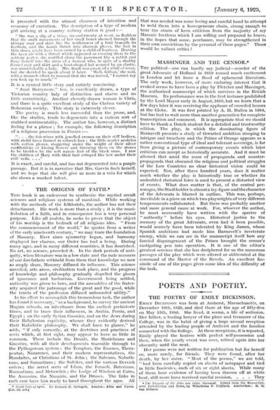MASSINGER AND THE CENSOR.* Tim political—one can hardly say judicial—murder
of the great Advocate of Holland in 1619 roused much excitement in London and let loose a flood of ephemeral literature. The only work, however, of more enduring interest that it evoked seems to have been a play by Fletcher and Messinger, the authorized manuscript of which survives in the British Museum. Its performance was in the first instance prohibited by the Lord Mayor early in August, 1619, but we learn that a few days later it was receiving the applause of crowded houses at the Globe. It was first printed by A. H. Bullen in 1884, but has had to wait more than another generation for complete transcription and comment. It is appropriate that we should have to thank a Dutch student for a detailed and trustworthy edition. The play, in which the dominating figure of Barnavelt presents a study of thwarted ambition stooping to intrigue and treachery and the Prince of Orange appears as a rather conventional type of ideal and tolerant sovereign, is far from giving a picture of contemporary events which later criticism can accept as historically accurate. And it must be allowed that amid the mass of propaganda and counter- propaganda that obscured the religious and political struggles of the Low Countries no clear historical vision could be expected. Nor, after three hundred years, does it matter much whether the play is historically true or whether its undoubted rhetorical force is used to present a distorted view of events. What does matter is that, of the central per- sonages, the Stadtholder is almost a lay-figure and the character of the Advocate is blurred in outline. This was, perhaps, inevitable in a piece on which two playwrights of very different temperaments collaborated. But there was probably another and more general cause at work. For, whoever the author, he must necessarily have written with the spectre of " authority " before his eyes. Historical justice to the memory of the great Advocate, even had it been possible, would scarcely have been tolerated by King James, whose Spanish ambitions had made him Barnavelt's inveterate enemy, while we can see in the manuscript itself how any fancied disparagement of the Prince brought the censor's castigating pen into operation. It is one of the editor's greatest services that she has deciphered for us the numerous passages of the play which were altered or obliterated at the command of the Master of the Revels. An excellent fac- simile of one of the pages gives some idea of the difficulty of the task.


















































 Previous page
Previous page